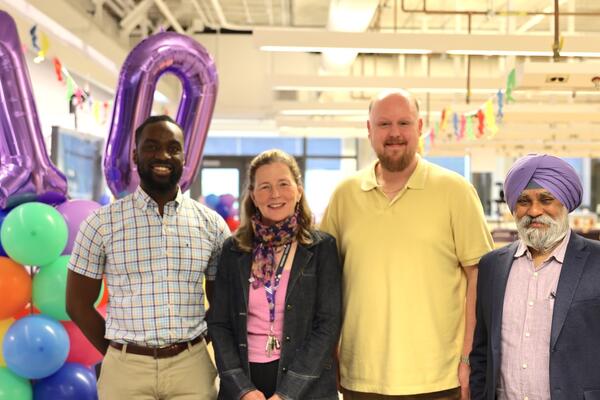
Making waves in the world of amphibious architecture
Waterloo Engineering graduate from the School of Architecture embraces interdisciplinary collaboration to guide her experience

Waterloo Engineering graduate from the School of Architecture embraces interdisciplinary collaboration to guide her experience
By Charlotte Danby Faculty of EngineeringWhen she was 16 years old, Alexa Megan Holder spent a month camping and canoeing in Northern Ontario. She loved it so much that she became a wilderness guide with the YMCA, taking kids between six and 16 years old on river trips. Her recreational love of wild waters grew into an academic interest that guided her towards Waterloo’s Faculty of Engineering for a Bachelor of Architectural Studies (BAS).
Holder crosses the stage at convocation this fall to mark the completion of her undergraduate degree, though her studies at Waterloo will continue. Holder recently began her Master of Architecture (MArch) degree in the Collaborative Water Program, with funding from the Social Sciences and Humanities Research Council (SSHRC). For her thesis, she plans to focus on how building design can mitigate flood related issues and disasters.
Overseen by the University’s Water Institute, the Collaborative Water Program involves 11 academic units to deliver the most interdisciplinary water graduate program in Canada. For Holder, this opportunity to focus her research on water, and work with students from other disciplines, is invaluable.
“University studies are typically siloed into faculties,” Holder says. “You don’t often get a chance to collaborate with other disciplines, share knowledge and ideas, and engage with different viewpoints — at least not formally.
“And yet in practice, a lot of what we do as architects is an interdisciplinary effort that can involve engineers, designers, archeologists, policy makers, social workers, urban planners and more. Interdisciplinary academic experience is critical to elevate our research and our work. I believe it will help prepare us — and many other professionals — for the big issues that we hope to address in the coming years.”
Holder intentionally pursued a well-rounded university experience that went beyond academics. During her undergrad, she joined the Waterloo Architecture Students’ Association (WASA) and got involved in research work as an assistant with the Buoyant Foundation Project — a not-for-profit organization founded by Waterloo architecture professor Dr. Elizabeth English.
“I wanted to learn more about what research in architecture looks like,” Holder says. “The Buoyant Foundation Project was a perfect fit for me as it investigates how amphibious technologies can retrofit housing to better withstand rising water levels and flooding. This has shaped my master’s thesis topic to focus on flood mitigation (amphibious) architecture in Canada.”
Holder is still part of the Buoyant Foundation Project team, now in the role of project manager. She credits her undergraduate experience with the foundation, as well as her five co-op work terms, with helping her develop her capabilities and confidence. She worked in Rotterdam, Elora, Toronto, Victoria and New York — an exciting mix of local and international exposure to different ways of living and working.
“I did a lot of hiking and rock climbing in Victoria, not so much in New York,” Holder explains. “The two cities are worlds apart, so it was great to experience both and get a better idea of what and where suits me before I start looking for a fulltime job.”
Once she’s completed her master’s degree, Holder wants to work in sustainability and climate change disaster mitigation, and is open to roles as either an academic researcher or an architect in the field. Regardless of where her important work takes her, Holder knows that the connections she’s made at Waterloo will stay with her.
“Our class of 2023 is a very close-knit group,” she says. “The School of Architecture campus is small which makes getting to know each other easy. Most of us in my cohort are not from the area so when we were first-year students, we grabbed our orientation packs and went looking for housing together. By the end of that first day, I’d made some good friends, including my current roommate. We moved in together in our second year and still live together.
“I imagine a lot of new first-year students are still settling in and figuring things out. Change is challenging but it’s amazing to discover what you’re made of. For me, getting involved in areas outside my course work was hugely rewarding, introducing me to interesting ideas, experiences and people. Thanks to my undergraduate degree, I feel grounded and ready for this next adventure.”

Read more
Redefining capstone learning by bringing students, faculty and community partners together to tackle real-world challenges

Read more
Here are the people and events behind some of this year’s most compelling Waterloo stories

Read more
The Pearl Sullivan Engineering IDEAs Clinic marks a decade of delivering experiential learning embedded in the real world and mentored by industry professionals
The University of Waterloo acknowledges that much of our work takes place on the traditional territory of the Neutral, Anishinaabeg, and Haudenosaunee peoples. Our main campus is situated on the Haldimand Tract, the land granted to the Six Nations that includes six miles on each side of the Grand River. Our active work toward reconciliation takes place across our campuses through research, learning, teaching, and community building, and is co-ordinated within the Office of Indigenous Relations.